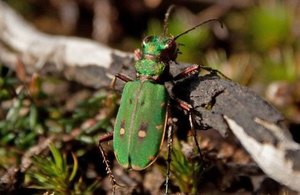Online analytical tool launched to aid invertebrate conservation
Natural England and the Centre for Ecology & Hydrology launch analytical tool to aid conservation efforts on almost 12,000 invertebrates.

Green tiger beetle on Thursley Common National Nature Reserve © Natural England
Natural England and the Centre for Ecology & Hydrology (CEH) have launched a new online database and analytical tool called Pantheon, which helps us better understand conservation status and habitat-related traits of invertebrates.
From the weevils perched on the leaves of our trees to worms burrowed deep in the earth beneath our feet, invertebrates play a crucial role to improve the ecology of our natural environment.
James Cross, Chief Executive at Natural England said:
Pantheon is a fantastic example of how we are pushing the boundaries of science and IT to benefit invertebrate conservation. Researchers, ecologists and land managers will have access to a wealth of data.
This database will play an important role in identifying trends to better protect our natural environment.
Pantheon was developed to assist invertebrate nature conservation in England. Users import lists of invertebrates into the database, which then analyses the species, attaching associated habitats, resources and conservation status against them.
This information can then be used to assign quality to sites, assist in management decisions and prompt further other ecological study. This database will help site managers, researchers, ecological consultants and is also available to the public.
With contributions from Buglife and the Royal Society for the Protection of Birds, this project brings together 10 years’ worth of work by Natural England’s scientists to make it easier than ever to understand the importance of invertebrates in England.
Pantheon can tell users which species are typical of woodland canopies, dead wood and shaded woodland ground layers. It can identify how many species from a selected site are using flower-rich habitat and which specific flowers they need. In the future, Pantheon will also help users understand the impact of climate change on species communities in the wider countryside and protected places, such as National Parks.
Dr Hannah Dean, database and informatics specialist at the CEH, said:
CEH is working to develop innovative, world-class outputs that advance scientific knowledge and understanding. Pantheon combines an extensive online database with a set of analytical tools. Together these deliver vital information on invertebrate species and their habitats, enabling evidence-based decisions that support the conservation of natural resources.
Explore the Pantheon database, which is free to use.